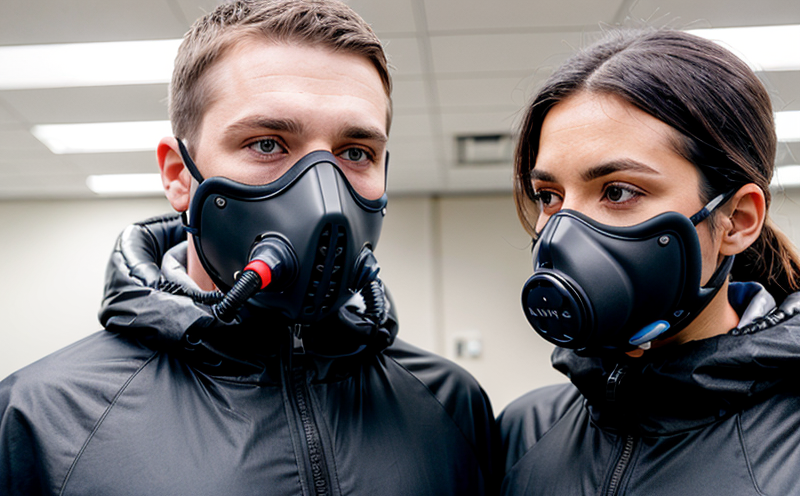ISO 16975 Respirator Fit Testing
The ISO 16975 standard provides a robust framework for ensuring that respirators fit properly to an individual's face, thereby providing effective protection against airborne contaminants. This service is crucial in industries where workers are exposed to hazardous environments and requires adherence to international standards for occupational safety.
Respirator Fit Testing plays a pivotal role in maintaining the integrity of Personal Protective Equipment (PPE) within the Occupational Safety & Protective Equipment sector. The testing process ensures that respirators fit snugly around the face, which is essential for their effectiveness during use. According to ISO 16975, there are two primary methods used: quantitative and qualitative fit testing.
Quantitative Fit Testing (QFT) measures the percentage of leakage into the mask using a laser smoke generator or similar device. This method provides precise data on how well the respirator fits around an individual's face. On the other hand, Qualitative Fit Testing (QFit) relies on subjective responses from the wearer to determine if they can detect air leaks.
The process begins with a pre-test check of the respirator and fit tester equipment. This ensures that all instruments are functioning correctly before testing begins. Next, the individual dons the respirator and undergoes either quantitative or qualitative fit testing based on the specific requirements set by the organization. Post-testing involves cleaning any contaminated areas and storing the respirators appropriately.
The importance of this service cannot be overstated, especially in high-risk environments where even minor discrepancies could lead to severe health issues for employees. Compliance with ISO 16975 is not just about protecting individual workers but also about maintaining a safe work environment compliant with international standards.
For quality managers and compliance officers responsible for ensuring worker safety, this service offers peace of mind knowing that their staff are equipped with properly fitting respirators. R&D engineers can benefit from the insights gained during testing to improve designs and materials used in creating next-generation protective gear. Procurement teams will find value in verifying that purchased products meet stringent quality benchmarks.
Understanding the nuances behind ISO 16975 helps stakeholders appreciate its significance beyond mere compliance. By adhering to these standards, organizations demonstrate their commitment to fostering a culture of safety and responsibility towards employee well-being.
In conclusion, ISO 16975 Respirator Fit Testing is an indispensable component in safeguarding workers exposed to hazardous conditions. It ensures that respirators function optimally, providing reliable protection against airborne contaminants. Through rigorous testing procedures, this service contributes significantly to maintaining occupational health and safety standards globally.
Applied Standards
The ISO 16975 standard is widely recognized for its comprehensive approach to respirator fit testing. It encompasses various aspects including the selection of appropriate devices, implementation procedures, and interpretation methods. This international consensus document sets forth clear guidelines that ensure consistent results across different regions.
- Quantitative Fit Testing (QFT): Utilizes laser smoke generators or similar apparatus to measure the percentage of leakage into the mask. This method provides precise quantifiable data on how well the respirator fits around an individual's face.
- Qualitative Fit Testing (QFit): Relying on subjective responses from the wearer, this approach determines if they can detect air leaks by inhaling a solution that produces visible smoke when exhaled through a respirator.
- Post-Testing Procedures: Following completion of either QFT or QFit testing, it is essential to clean any contaminated areas thoroughly and store the respirators appropriately to maintain their effectiveness for subsequent uses.
The implementation of these standards ensures that organizations comply with regulatory requirements while enhancing overall safety measures within workplaces. By leveraging this internationally accepted framework, businesses can confidently assert their commitment to employee welfare and operational excellence.
Eurolab Advantages
EuroLab stands out as a leading provider of ISO 16975 Respirator Fit Testing services due to several key advantages:
- Expertise & Experience: Our team comprises highly skilled professionals with extensive experience in occupational safety and protective equipment testing.
- Comprehensive Services: We offer a full range of respiratory protection testing solutions tailored specifically for your organization's needs.
- State-of-the-Art Facilities: Equipped with cutting-edge technology, our laboratories provide accurate and reliable test results every time.
- Custom Solutions: Whether you require routine inspections or specialized assessments, we can design customized plans to meet your unique requirements.
- Commitment to Quality: At EuroLab, quality is paramount. We adhere strictly to international standards and best practices in all our operations.
- Customer Satisfaction: Our commitment to excellence extends beyond technical proficiency; we prioritize delivering top-notch customer service throughout the entire testing process.
Partnering with EuroLab means accessing unparalleled expertise, state-of-the-art facilities, and unwavering dedication to quality. Together, let’s ensure that your workplace remains a safe haven for all employees.





